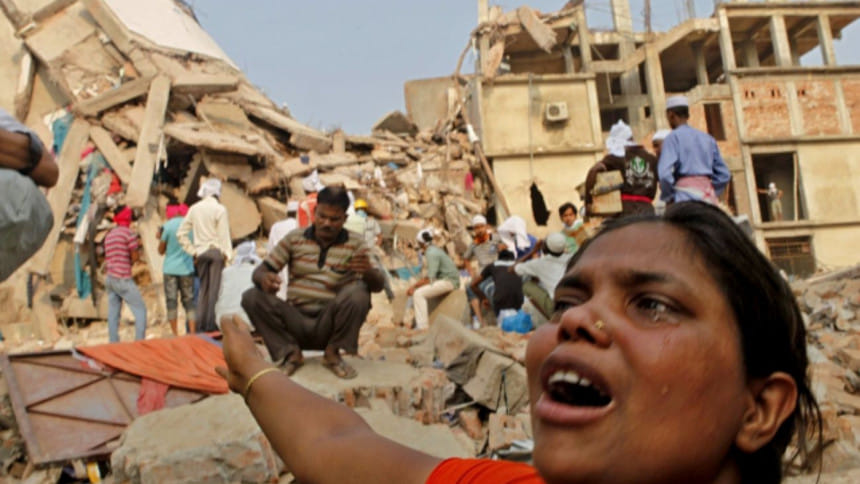Two years of denial and betrayal

THE families of Rana Plaza victims have passed two years crying for their dear and near ones, suffering in their daily lives and waiting for due compensation and jobs. In spite of tall promises, the government and the parties responsible for the disaster and corporate homicide have done little to heal the collective wound. There is no visible end to the uncertainty and suffering of thousands of families.
If we pinpoint the responsible parties for the death traps in garment factories of Bangladesh in general and Rana Plaza in particular we find at least three groups from home and abroad. They include: (1) owners of factories, buildings and the BGMEA, (2) international buyers and brand retailers, and (3) the government and its relevant agencies.
Despite cracks in the complex, the five garment factories situated in Rana Plaza, owned by Sohel Rana who was associated with the ruling party, were kept open to fill overdue orders from international buyers. Factory authorities forced workers either to come to work or face punishment. When generators were restarted after a power blackout, the building collapsed immediately with nearly five thousand workers working in the factories. Therefore the owners of the factories and the building bear the prime responsibility of the mass killing.
Secondly, as an umbrella organisation of garment owners, BGMEA has the responsibility of monitoring compliance and advocating for high industrial standards. They have a lengthy failure record in this regard; even the scale of the Rana Plaza disaster could not change their attitude. On the contrary, this organisation appears as the collective muscle of the owners to protect them from the law. That has always encouraged owners to ignore safety rules.
Thirdly, things on the ground are not supposed to be unknown to the international buyers and retailers. Factories often accept abnormally low prices in an effort to attract buyers and grab orders. In turn, and in order to maintain a profit rate, low cost suppliers often ignore safety measures and reduce workers real wage. Such cost cutting measures make the workers more vulnerable.
A chain of subcontractors and agents work beside global brands and approved factory owners are also responsible for these disasters. Research on the sector found the largest factory groups in Bangladesh as featuring 'showcase' factories with 'less compliant facilities as the productive engine of their operations'. It is also found that some of the largest multinational companies are heavily reliant on agents, 'matchmakers' between buyers and factories, to source their products. There are in fact many parties, local and global, to extract profit on the value created by garment workers. But they always skip responsibility.
Finally, only the government has the legal authority and obvious responsibility to ensure safe environment in factories, job security of the workers; to carry out regular monitoring and when necessary bring parties to justice when they fail to follow the rules. If any disaster happens, the government as the sovereign authority must bear responsibility to find out wrongdoers, ensure compensation and work for necessary reforms. In practice, the government has played very little to change its callous and irresponsible attitude towards workers, to punish corrupt officials, owners and even failed to formulate a reasonable compensation policy.
The long delay in compensation payment for thousands of Rana Plaza victims has caused unbearable sufferings for the victims and provided a lot of opportunities for the touts and rent seekers to get benefits by cheating victims' families.
INTERNATIONAL INITIATIVES
After the Rana Plaza disaster, citizens around the world demonstrated their discontent and anger on the conditions of workers in Bangladesh. In response to citizens' protest we see some initiatives by global brands and retailers in garments importing countries. Most important are the formation of the Accord and the Alliance. Both initiatives were planned for five years.
The Accord of Fire and Building Safety (Accord) was established on May 15, 2013.
While the vast majority of Accord signatory companies are European, some North American brands also joined the agreement. The American Apparel and Footwear Association and several US senators took initiatives to establish a non-binding programme, the Alliance that was formed in July 2013. Unlike Accord, the executive leadership of the Alliance consists of industry heads and company representatives.
While the Accord is a legally binding agreement between companies and trade unions, the Alliance is not legally binding and has no role for trade unions and workers and worker representatives. However, the Accord and the Alliance serve very similar functions in Bangladesh: they create a short-term inspection and monitoring system among some selected factories, 'conduct training for management and workers on fire and building safety, and provide some level of resources to their primary suppliers for remediation efforts'. It is interesting to note that, supplying companies of these facilities are already having sales show in Bangladesh!
These initiatives, however, do not cover the issue of compensation. In September 2013, representatives from the government, the garment industry both locally and internationally, trade unions and non-governmental organisations, formed the Rana Plaza Coordination Committee, with the International Labour Organisation (ILO) acting as coordinator. Based on the compensation estimates for the victims of Spectrum Garments using the benchmark of ILO, an approximate total of US $74.5 million has been estimated to be required to compensate the victims of Rana Plaza. That is far from being realised.
ILO, while coordinating Rana Plaza donor funds, is struggling to mobilise necessary funds to pay the compensation. It continues circulating appeal for donation from people around the world, when many of the parties responsible are escaping their responsibility.
It is important to note that all funding from the brands are still voluntary, no legal system has been formulated to force brands to fund as compulsory liability. When thousands of families of workers are living in permanent trauma, national and multinational enterprises have failed to uphold their responsibilities. No wonder that they make ways to increase their profit more than before.
GAINERS REMAIN GAINERS
Several studies show that with some of the world's lowest wages and no job security for its workers, the RMG industry of Bangladesh maintains one of the highest profits for owners, buyers and global retailers. Inhuman working conditions, low wages, verbal and physical abuse, irregular or non-payment of dues and the inability to organise are still common in many of the factories supplying world-class garments.
In the two years following the Rana Plaza disaster, the US government has earned more than US $1 billion as duty imposed on imported garments from Bangladesh, but it did nothing to make US brands accountable! On the other hand, it suspended GSP services from Bangladesh 'to punish BD garment owners' where garments have never enjoyed the GSP facility!
As discussed earlier, the government of Bangladesh did little to protect workers interest, but the owners have succeeded to increase their benefit from public fund. Those include more export incentives, less duty on source, etc. Duty on source was reduced from 0.8 percent to 0.3 percent. Although the government provided benefit of nearly BDT 20 billion for the owners in this period, it failed to hand over donation money of BDT 1.2 billion to the workers, deposited to the Prime Minister's fund by different individuals and groups for the victim workers in the same period.
The global net of injustice allows factory owners, BGMEA, agents and global retailers to avoid responsibility, even after the murder of thousands. The government remains indifferent to its responsibility to take care of its own citizens. This shows a failed system of accountability at home and on a global scale.
The writer is member secretary of the National Committee to Protect Oil, Gas, Mineral Resources, Power and Ports.

 For all latest news, follow The Daily Star's Google News channel.
For all latest news, follow The Daily Star's Google News channel. 



Comments